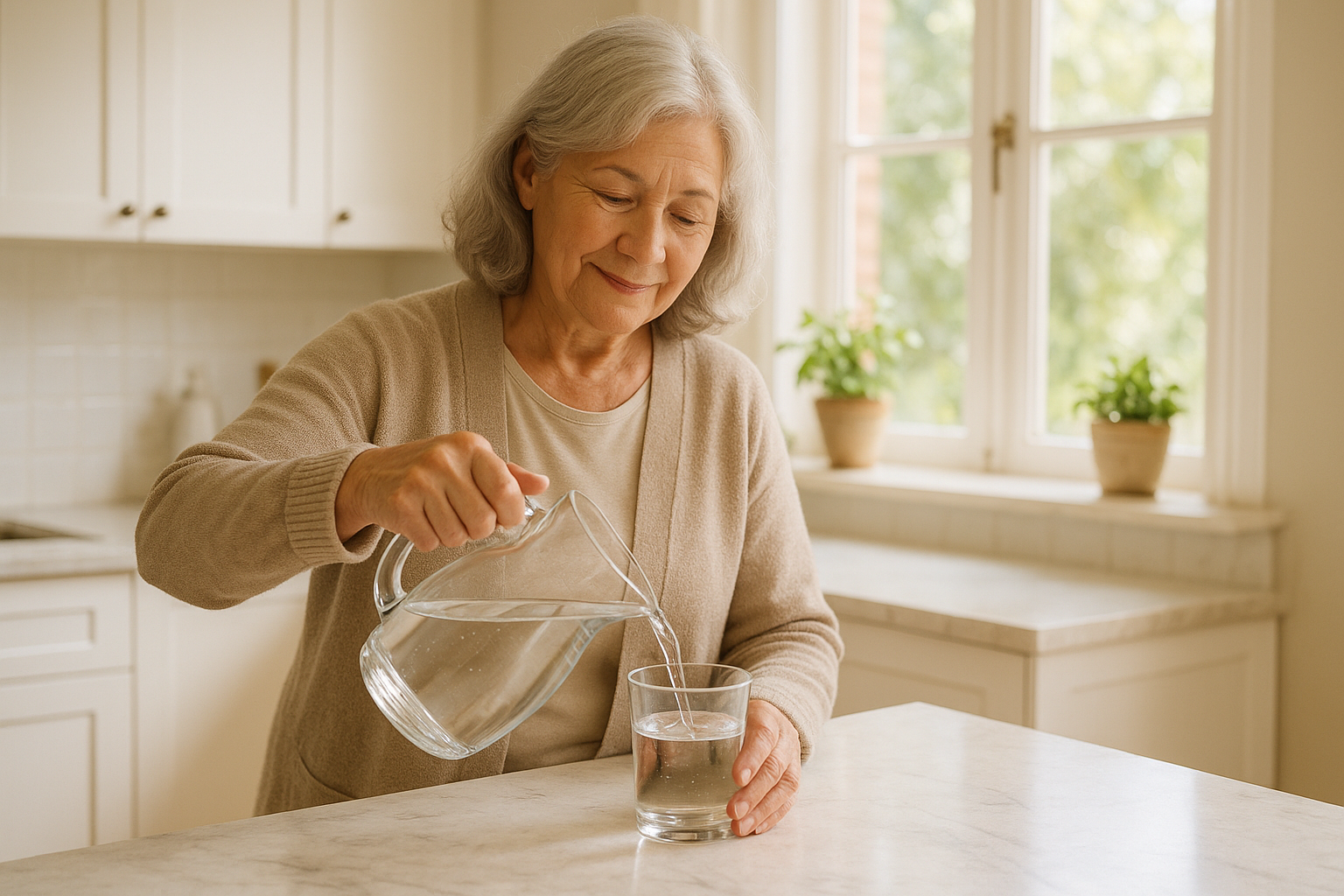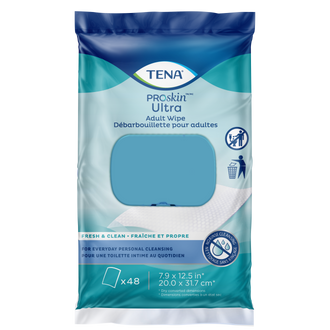Sep 04, 2025
‘Staying hydrated’ isn’t just a general recommendation from a doctor or health expert. Water does more than just quench your thirst; it also plays a critical role in how your kidneys do their job in your body.1
Dehydration and kidney function are more connected than you might think. So, let’s explore how your daily water intake affects your kidneys, the signs of dehydration to look out for, and how to keep your kidneys healthy.
Why Hydration Matters for Kidney Health
Your kidneys are bean-shaped organs that do more than filter waste; they help keep your body balanced by:1
- Managing your electrolyte levels.
- Filtering your blood to remove toxins and excess waste.
- Regulating your body’s pH levels.
- Producing essential hormones that control blood pressure and support red blood cell production.
Each day, your kidneys filter around 50 gallons of blood; and water makes up a large part of that volume.1 Staying hydrated helps maintain this blood volume, allowing your kidneys to work efficiently.1 It also helps flush out toxins and lowers the risk of urinary tract infections (UTIs) and kidney stones.1,2
What Happens to the Kidneys When You’re Dehydrated?
When you're dehydrated, there is an increase in the antidiuretic hormone (ADH).3 During dehydration, ADH plays its role by:3
- Acting on your kidneys to hold on to sodium and water, causing you to pee less.
- Acting on the blood vessels in your kidneys to reduce blood flow.
When there is less blood flow to the kidneys' filtering units (nephrons), they can't effectively remove waste from the body.1 If dehydration continues for too long or becomes severe, this strain can lead to acute kidney injury (AKI).1
Short-Term vs Long-Term Effects of Dehydration on the Kidneys
Dehydration can affect your kidneys in both the short and long term.4,5 When you don’t drink enough water, the first thing your body does is signal your thirst.5
If that signal is ignored, your kidneys begin to feel the strain. In the short term, you might notice:4
- Dark yellow urine
- Less frequent peeing
- A dry mouth or lips
These are some signs of mild to moderate dehydration; they’re typically easy to reverse by drinking enough fluids.6
Long-term effects happen when dehydration continues over time, it can increase your risk of more serious kidney problems, including: 5
- Kidney stones
- Urinary tract infections (UTIs)
- Chronic kidney disease (CKD)
Dehydration can keep progressing, and if left unchecked, it can lead to even more serious complications.7
Dehydration Risks in Vulnerable Groups
Although anyone can become dehydrated, some people are more vulnerable6 and may need extra care and support:
- Older adults: With age, the sense of thirst may decline.7 Dementia, stroke, mobility issues, or a fear of incontinence can also make it harder to stay hydrated.7 They may need help remembering to drink or get water.
- Babies and young children: Severe diarrhea, vomiting, high fever, and inability to tell when they are thirsty can put them at risk.6
- People recovering from an illness: Even a cold or sore throat can make eating or drinking difficult, increasing the risk of dehydration.6
- People with kidney conditions: They may have difficulty holding water, leading to dehydration.8
- People with diabetes: High blood sugar levels can lead to frequent bathroom trips, which increases fluid loss.1 This applies to both type 1 and type 2 diabetes.6
- People using certain medications: Laxatives, diuretics, and certain antihypertensives increase the risk of becoming dehydrated.8
It is important to talk to your doctor before stopping any medication or reducing the amount of water you drink.
Signs Your Kidneys May Be Affected by Dehydration
Paying attention to early signs can help you stay hydrated and avoid complications down the line.7,8 Here are some signs of dehydration you may notice:
- Less frequent peeing4
- Swollen feet or ankles6
- Darker urine6
- Fatigue4
- Dry mouth or lips4
- Back pain4
Pee smelling stronger than usual? Learn more about what strong-smelling urine means for your kidney health.
Causes of Dehydration
Your body loses water daily through different ways like breathing.6 Generally, you replace it by eating and drinking fluids.6
Yet, but it is possible for your body could to lose more water than it can takes in.6 When that happens, dehydration can set in,6 and over time, it can strain your kidneys.1
Some common causes of dehydration include:
- Fever6
- Vomiting6
- Diarrhea6
- Excessive sweating during hot weather or physical activity7
- Not drinking enough water throughout the day7
- Drinking too much alcohol9
- Living with certain health conditions like diabetes6
- Taking medications like diuretics6
Did you know that your diet can affect your bladder and kidneys for the better? Learn more about what to eat and drink for bladder and kidney health.
How Much Water Do Your Kidneys Really Need?
You should aim for 2 to 3 liters of water a day, but this isn’t a one-size-fits-all solution.1 How much water you need for kidney health depends on several factors, including:1
- The climate you live in.
- How active you are.
- Whether you're ill or managing a health condition.
It’s important to listen to your body. Instead of drinking large amounts all at once,6 try sipping water consistently throughout the day.
If you’re unsure about how much water is right for you, speak to your doctor for guidance.
Tips to Stay Hydrated and Support Kidney Function
Here are some helpful tips to help you stay hydrated:
- Check signs of dehydration in your urine; aim for a pale-yellow color.1
- Try eating fruits high in water, like oranges or watermelon.1
- Have a water bottle nearby and sip regularly throughout the day.
- Make use of apps for reminders to drink water.
- Drink extra water before and after exercise, or during hot weather.7
- Talk to your doctor if you're ill or taking medications like diuretics, so you can adjust your water intake safely.1
When to Seek Medical Help
Dehydration can be dangerous.6 It can lead to serious complications, including kidney damage.6 If you notice any of the following symptoms, it’s important to go to the nearest emergency department immediately:6
- Confusion
- No pee at all
- Dizziness
- Fatigue
- Racing heartbeats or breaths
- Fainting
Getting help early can make a big difference and prevent long-term effects.
How many bathroom trips are normal? See how you compare and learn more about how often should you urinate daily.
References
1. Maheshwari DA. Understanding Water Intake’s Effect on Kidney Function [Internet]. Physionyx. 2024 [cited 2025 Jul 1]. Available from: https://physionyx.com/articles/water-intake-kidney-function/
2. Mukherjee DA. What Are the Effects of Water on Kidney Function? [Internet]. Icliniq.com. iCliniq; 2023. Available from: https://www.icliniq.com/articles/kidney-and-urologic-diseases/effects-of-water-on-kidney-function
3. Chapman CL, Johnson BD, Parker MD, Hostler D, Pryor RR, Schlader Z. Kidney physiology and pathophysiology during heat stress and the modification by exercise, dehydration, heat acclimation and aging. Temperature [Internet]. 2020 Oct 13;8(2):108–59. Available from: https://www.ncbi.nlm.nih.gov/pmc/articles/PMC8098077/
4. UTI from Dehydration: Risks, Symptoms, and Complications [Internet]. BiologyInsights. 2025. Available from: https://biologyinsights.com/uti-from-dehydration-risks-symptoms-and-complications/
5. Kathryn Watson. Chronic Dehydration: Symptoms, Causes, Treatment, and More [Internet]. Healthline. 2023. Available from: https://www.healthline.com/health/chronic-dehydration#symptoms
6. WebMD Editorial Contributor. What is Dehydration? What Causes It? [Internet]. WebMD. WebMD; 2023. Available from: https://www.webmd.com/a-to-z-guides/dehydration-adults
7. James L. Lewis III,. Dehydration - Hormonal and Metabolic Disorders [Internet]. Merck Manual Consumer Version. 2025. Available from: https://www.merckmanuals.com/home/hormonal-and-metabolic-disorders/water-balance/dehydration#Symptoms_v770569
8.Taylor K, Jones E, Tripathi A. Adult dehydration [Internet]. PubMed. Treasure Island (FL): StatPearls Publishing; 2022. Available from: https://www.ncbi.nlm.nih.gov/books/NBK555956/
9. Rachael Ajmera, MS, RD. Do Some Drinks Cause Dehydration? [Internet]. Healthline. 2022. Available from: https://www.healthline.com/nutrition/dehydrating-drinks#alcohol-energy-drinks







